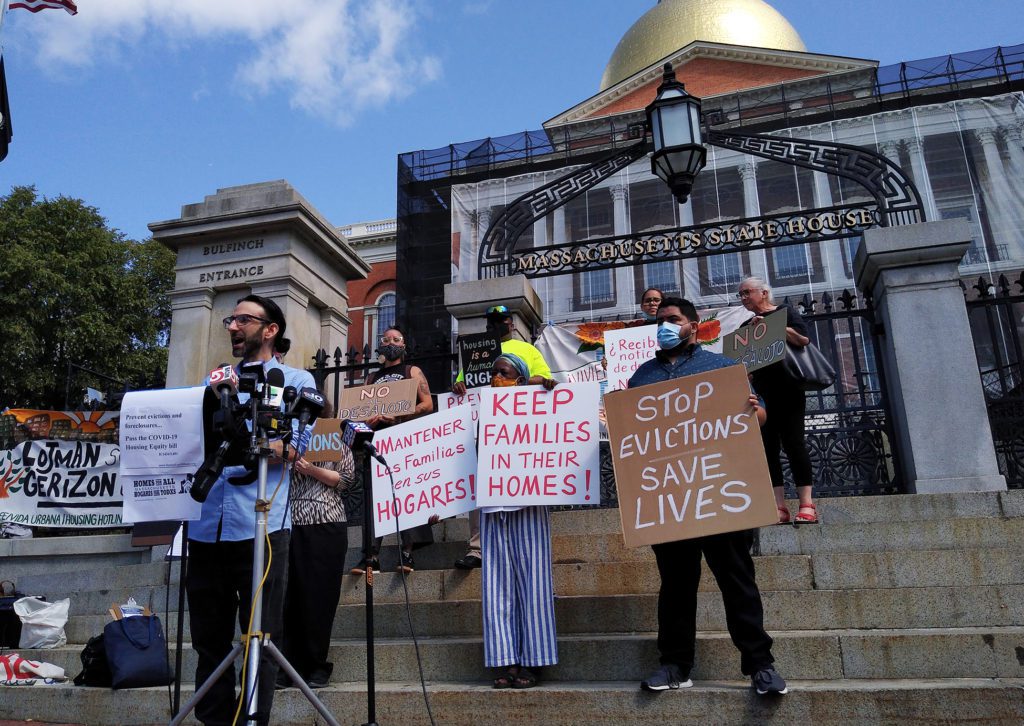
The federal eviction moratorium expired on Saturday, July 31, and local activists are pushing for state legislation to extend protections for residents at risk of losing their housing.
“Massachusetts faces a choice,” said Isaac Simons Hodes, director of the Lynn United for Change Empowerment Project at a press conference Friday organized by Homes for All Massachusetts. “Will people struggling with rent and mortgages in the wake of the COVID-19 pandemic get help? Or will they get eviction and foreclosure notices?”
Supporters of the COVID-19 Housing Equity bill, which is currently referred to the Joint Committee on Housing in the Massachusetts Legislature, say this legislation offers the right answer to the oncoming eviction struggles to be faced by renters.
“We have the solution in front of us,” Simon Hodes said. “The COVID-19 Housing Equity Bill will protect people and lead us toward a strong recovery.”
The proposed legislation would require landlords and tenants to pursue rental assistance prior to an eviction. It also would protect renters and mortgage-holders if their financial hardships are due to or exacerbated by the pandemic; would limit evictions to only those with just cause for the duration of the COVID-19 state of emergency, which expired June 15, and 12 months after; and would prioritize the most vulnerable residents and those hit hardest by COVID-19 for the distribution of rental assistance funds.
Senator Pat Jehlen, the bill’s lead sponsor in the senate, said she thinks these actions should not be controversial.
“Of all the ways we should be spending money right now [as a state], this is among the most urgent,” Jehlen said.
Public health organizers at the event said that housing is intimately linked to health and that the pandemic has only brought that connection to the forefront.
“Overwhelming research has long shown the connection between stable housing and health outcomes,” said Jeneczka Roman, the advocacy and coalition manager at the Massachusetts Public Health Association. “In the context of a communicable disease pandemic, the link is all the more immediate.”
Roman said the end of the eviction moratorium will impact public health and the community’s ability to respond to the COVID-19 pandemic.
“Its fallout will lead to a host of negative health impacts, including a heightened risk for COVID transmission, especially as the more contagious Delta variant rises in dominance,” Roman said.
Local organizers agree that now is not the time to resume evictions.
“In my tradition, we say that people can’t be evicted in a rainy season,” said Cindy Rowe, executive director of the Jewish Alliance for Law and Social Action. “This is our rainy season, right now. No one wants to see a deluge of people being evicted from their homes.”
Yet, with those federal protections expiring, many people will soon be at risk.
“We need to act now, and we need to pass this law now,” said Andres Del Castillo, an organizer with Right to the City Boston.
Del Castillo said it is important to keep residents protected.
“We shouldn’t wait until these protections expire and catastrophes start to occur,” Del Castillo said. “We should be proactive, not reactive.”
Mike Leyba, co-executive director at City Life/Vida Urbana, said that residents need action now.
“For legislators who are waiting to see what happens and to see what shakes out and how everything goes, this is not the time for waiting,” Leyba said. “There’s a lot of talk about rental assistance and mortgage assistance. There is a huge problem with getting the aid out to families that need it.”
Delays, he said, can have serious impacts on residents.
“Being unsure of where you’re going to lay your head at night has serious health consequences,” Leyba said. “It’s a barrier to children’s development. It’s unhealthy. The time to act is now.”
He also urged residents facing evictions not to panic and not to immediately move when they receive an eviction notice. His message was repeated by other organizers throughout the event.
“You are not alone,” said Mimi Ramos, executive director at New England United 4 Justice. “Only a judge can evict you. There are resources that can help you. And we are encouraging everyone in the community to take a stance and fight this fight.”
The federal moratorium, implemented by the Centers for Disease Control and Prevention (CDC), first took effect September 2020. It was extended four times, with the CDC’s latest extension stating that the agency did not intend to extend it further.
A Supreme Court ruling last month upheld the moratorium, but through a concurring opinion by Justice Brett Kavanaugh, any further extensions would have to be processed through Congress.
The Biden Administration made a last-minute request on Thursday that Congress extend the federal moratorium for one month in light of the recent spread of the Delta variant, but House Democrats were unable push the extension through before the body adjourned for a seven-week recess.






